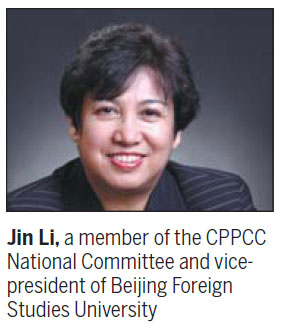Govt effort needed to promote culture
Updated: 2013-03-14 07:03
By Hu Haiyan (China Daily)
|
||||||||

CPPCC member says private institutions can support initiatives
China's political advisers have called for a well-coordinated system that would feature government taking the lead in promoting Chinese culture around the world, with private institutions playing a supportive role.
"Effective cultural exchange and cultural promotion across the world greatly help a nation be more influential and respectable on the global stage. To further spread Chinese culture, it is of great importance for government and private institutions to work together," said Jin Li, a member of the National Committee of the Chinese People's Political Consultative Conference and vice-president of Beijing Foreign Studies University.
She said China has made tremendous achievements in promoting its culture during the past few years. For instance, many Confucius Institutes have been set up across the world in recent years and there has been an increasing number of people showing an interest in Chinese culture and language, and taking courses in the institutes.
At present there are more than 400 Confucius Institutes in more than 100 countries and regions, according to Xu Lin, director-general of Hanban, which administers Confucius Institutes. Xu said that the number of institutes will hit 500 and the number of Confucius Classrooms will rise to 1,000 by 2015, with 1.5 million students registered.
BFSU has also promoted Chinese culture globally. Together with Hanban, the university has set up 18 Confucius Institutes across the world, and has established partnerships with more than 300 schools and universities in more than 70 countries and regions.
"If foreigners know more about the Chinese language, it gets easier for them to know and accept the nation," said Jin.
Despite the achievements, she also pointed out that some sectors leave much to be desired.
"One big challenge confronting the promotion of Chinese culture is lack of an effective collaborative system between the government and private institutions," said Jin.
During the two sessions this year, she submitted a proposal to the CPPCC National Committee suggesting that government and private institutions work together to promote Chinese culture.
"If the government is the only agent promoting Chinese culture overseas, Western people will dislike it because they will regard it as propaganda. It is also impossible for private institutions to act as the only ambassadors promoting culture in other nations, since they usually lack resources such as capital," said Jin.
"The most effective system should be one where the central government takes the lead in promoting culture overseas and private institutions play supportive roles," she said.
Take some cultural exchange programs as an example. The government can get approval and support from foreign governments to launch the programs, and private institutions can help train people to promote the programs.
In August, with government departments such as the Ministry of Education, the university set up the Collaborative Innovation Center for Chinese Culture Going Global, which serves as a nonprofit public institution to promote Chinese language and culture in other countries.
During the opening ceremony of the center, Li Weihong, a CPPCC National Committee member and vice-minister of education, said that the center will play a bigger role in promoting Chinese culture using the university's competitive edge in foreign languages.
Yang Xueyi, a CPPCC National Committee member and Party chief of BFSU, said that a big challenge for Chinese private institutions is lack of funds and enough people with a good command of foreign languages.
He said that since the university teaches the largest number of foreign languages in the country, BFSU aims to cultivate more talent in this regard.
About 60 foreign languages are now taught and that will surpass 70 by 2015, Yang said.
He also said that foreign students can contribute to the promotion of Chinese culture overseas. There are about 7,000 Chinese students and 1,000 foreign students, including the minister of education of Sri Lanka, now studying in the university, according to Yang.
"After studying in China, the overseas students will have more understanding of this nation. They can help Chinese culture go abroad as cultural exchange agents," said Yang.
huhaiyan@chinadaily.com.cn
(China Daily 03/14/2013 page6)

 In Photos: 7.0-magnitude quake hits Sichuan
In Photos: 7.0-magnitude quake hits Sichuan
 Li Na on Time cover, makes influential 100 list
Li Na on Time cover, makes influential 100 list
 FBI releases photos of 2 Boston bombings suspects
FBI releases photos of 2 Boston bombings suspects
 World's wackiest hairstyles
World's wackiest hairstyles
 Sandstorms strike Northwest China
Sandstorms strike Northwest China
 Never-seen photos of Madonna on display
Never-seen photos of Madonna on display
 H7N9 outbreak linked to waterfowl migration
H7N9 outbreak linked to waterfowl migration
 Dozens feared dead in Texas plant blast
Dozens feared dead in Texas plant blast
Most Viewed
Editor's Picks

|

|

|

|

|

|
Today's Top News
Live report: 7.0-magnitude quake hits Sichuan, heavy casualties feared
Boston suspect cornered on boat
Cross-talk artist helps to spread the word
'Green' awareness levels drop in Beijing
Palace Museum spruces up
First couple on Time's list of most influential
H7N9 flu transmission studied
Trading channels 'need to broaden'
US Weekly

|

|







